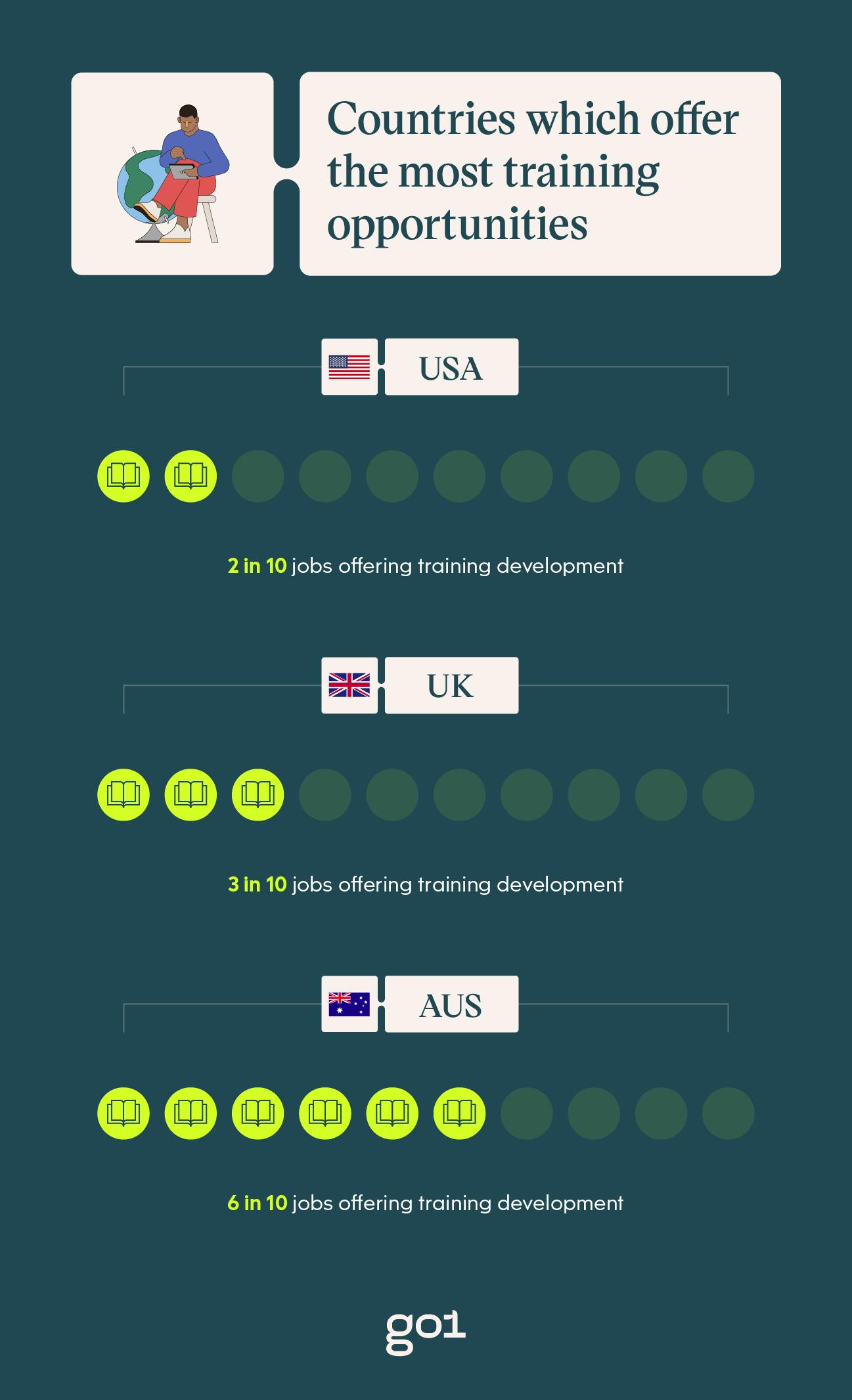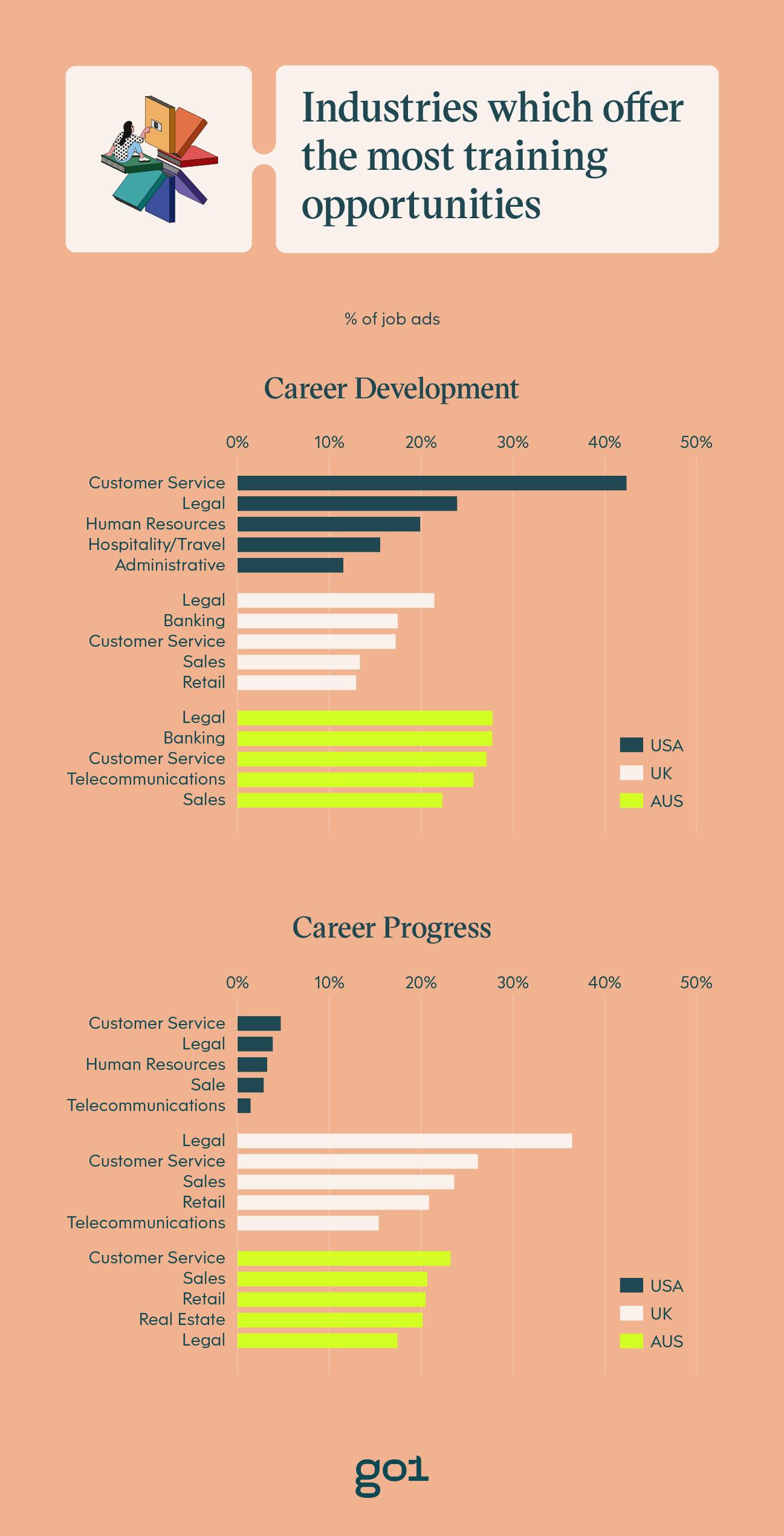
Training and skills: how do industries compare?

What are the most critical skills that today’s workforce is looking for? Although hard skills show off an employee's understanding of a particular ability, soft skills have become increasingly important as they indicate an ability to work with others and grow within a company.
And in a market that is dominated by technology with many roles being replaced by AI, employers are increasingly prioritising candidates with abilities who can do things that artificial intelligence can’t.
According to a recent study, soft skills training, including time and stress management, problem-solving, communication, and teamwork can improve employee productivity and retention, and increase a company’s return on investment by as much as 256 per cent.
Hiring candidates with these character traits can offer many benefits to you and your organisation, including increased efficiency and productivity, stronger interpersonal and professional relationships, more innovative solutions and company growth.
Not only that but offering more learning opportunities for employees to harness new abilities shows them that they’re an asset to your business. Improving employee experience this way is essential for retention.
With this in mind, Go1 has analysed thousands of job listings from Indeed.com, uk.indeed.com and au.indeed.com sector-by-sector to reveal the most in-demand soft skills and available training opportunities.
Job descriptions attached to job ads were extracted for mentions of soft skills and training-related keywords to reveal the most in-demand skills employers are looking for, which industries value certain types of skills more than others, along with the industries offering the most training opportunities.
The most in-demand soft skills by country
According to LinkedIn’s Global Talent Trends report, 89% of recruiters say when a hire doesn’t work out, it usually comes down to a lack of soft skills. With this in mind, we wanted to shed a light on what credentials employers are looking for in the US, UK and Australia.
In the US, problem-solving is the most sought-after across every sector, with 399,637 out of over 11 million job ads requiring potential candidates to be able to handle unexpected situations or difficult challenges. The second most sought-after skill is time management, with 289,143 mentions and then a further 261,574 job ads cited candidates who are confident.
In the UK, confidence is top of the list, with 72,875 out of 756,114 job ads mentioning this in their description. The second most in-demand skill employers are seeking is creativity, with 25,578 mentions and in third place, problem-solving, with 25,373 mentions.
In Australia, we see similar results as confidence is also the most mentioned skill, appearing in 11,875 job ads out of a possible 162,663. Time management ranks second place, with 11,197 mentions and problem-solving rounds up the top 3, with 9,394 mentions.
The graphic below highlights the other skills in demand in Australia, the US and UK.

The most in-demand skills by industry
When candidates are equally qualified for a job, it's often the difference in soft skills that can set the right candidate apart. Of course, degrees and qualifications are important, but the development of these personal attributes is a crucial part of strengthening a dynamic workforce. But how do different industries favour soft skills? We’ve looked at the industries with the largest amount of job ads that cited these skills to find out.

Countries which offer the most training opportunities
Learning and development (L&D) is often named as one of the top benefits employees want from an employer. According to LinkedIn, 94 per cent of employees would stay with a company longer if they invest in L&D.
One of the biggest reasons learning and development is now a necessity is that many companies are facing significant skills gaps. These gaps have appeared as an effect of emerging technologies that have shifted the demand for skills, as companies look at how to digitalise their operations.
Rapid technological evolution has led to easily-automated skills being taken over by machines or artificial intelligence. At the same time, these advancements in technology are driving the need for workers to develop the skills they do best - human qualities that artificial intelligence can’t replace, like critical thinking and creativity.
Reskilling can help HR and L&D managers retain existing employees in order to meet long-term goals and keep up with an evolving industry. By promoting workplace training and development, employers are showing current and future employees they care about their professional progression.
This can help attract and retain top talent for a business to succeed -without it, employees may leave, in particular Gen Zs, with 60% of 16-24-year-olds admitting they have left a job due to limited growth opportunities.
Not only that, it is providing a way to bridge the global skills gap, which is preventing businesses from being able to grow and provide a healthy work environment for existing employees who are having to take on additional work.
The data below shows how many job ads reference learning and development opportunities for potential candidates across the US, UK and Australia.

Industries which offer the most training opportunities
Our data shows that numerous industries offer great training opportunities to help potential employees succeed in their roles.
In the US, career development opportunities were cited in over 42% job ads in the customer service industry, and in the UK career progression was mentioned in 36.41% job ads in the legal sector.
Find out which other industries offer the most training opportunities below.

As we can see from our data, soft skills gaps can vary from industry to industry but soft skills are vital given the current state of the market. And the most efficient and effective way to expand your employees’ skills is online training.
If you're interested in seeing how Go1 can adapt to and answer your organisation's unique learning needs, book a demo with a Go1 team member today. Or, for more insights, subscribe to the Go1 newsletter to stay on top of all the latest L&D trends.
Methodology
The list of soft skills was collated from various sites like Indeed and LinkedIn. Data on job ads were then gathered from Indeed.com, uk.indeed.com and au.indeed.com sector-by-sector to ensure a spread of job ads across various industries and countries. Job descriptions attached to job ads were then extracted for mentions of the shortlisted soft skill or training-related keywords e.g. "creativity" and "career development." Data was gathered in June 2022. All data is available on request.




